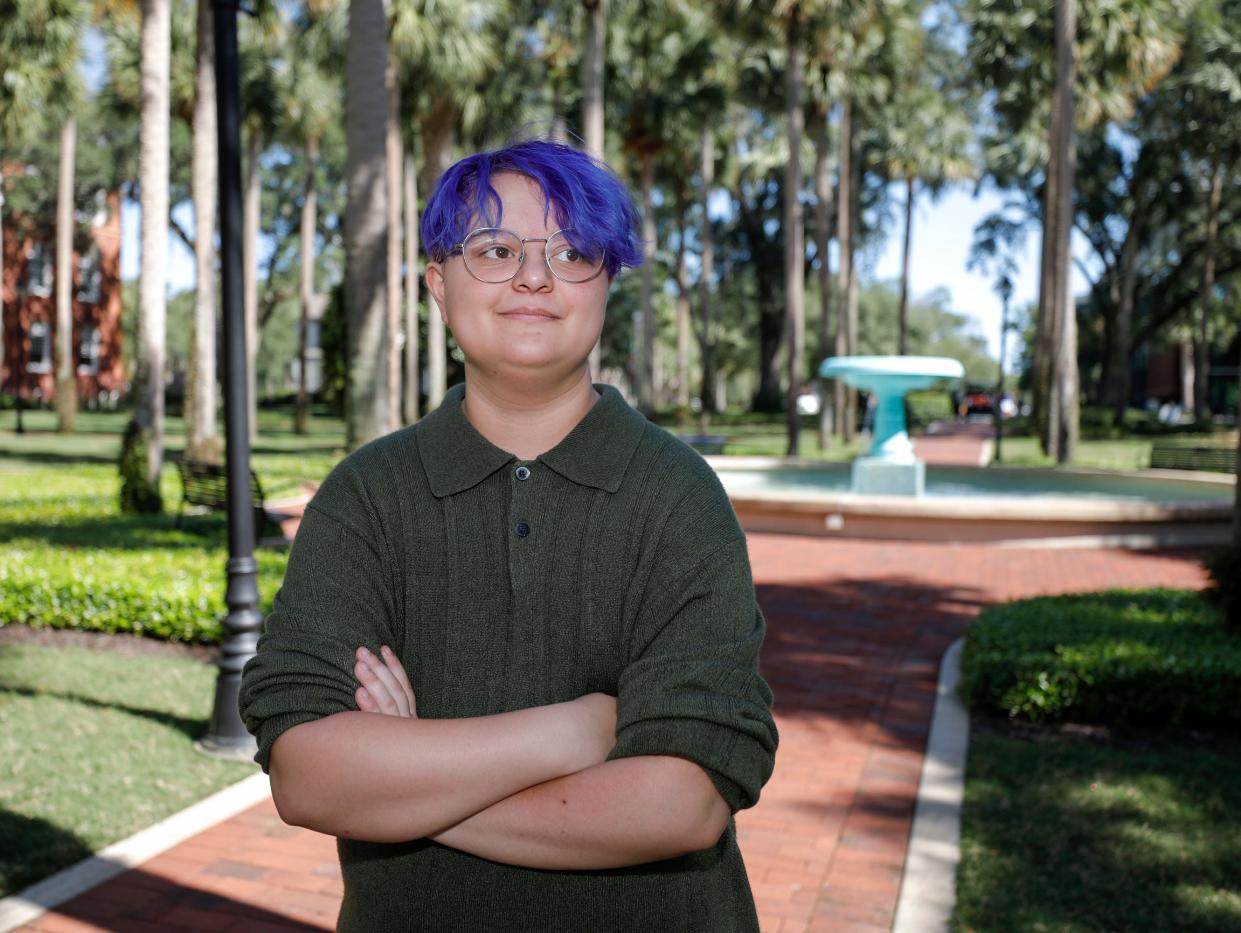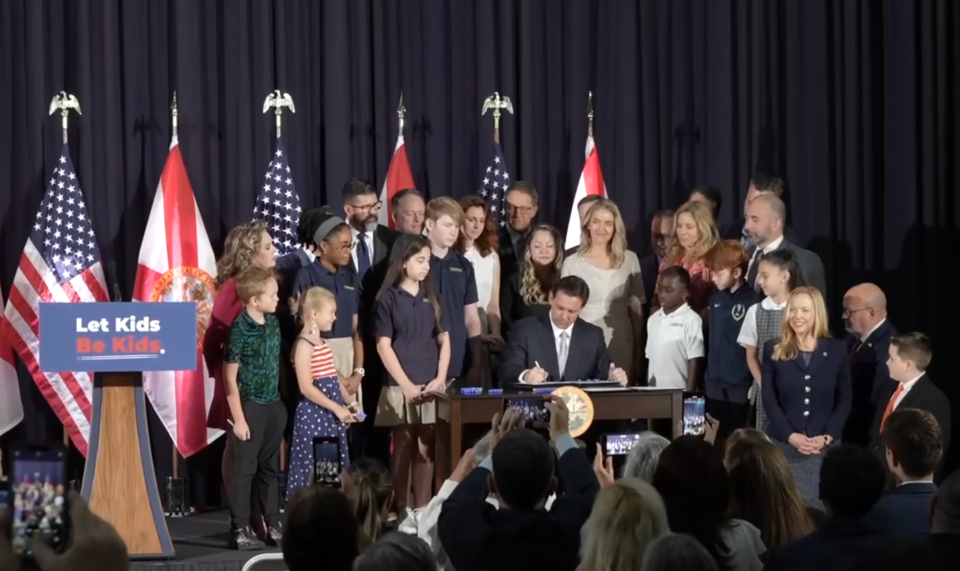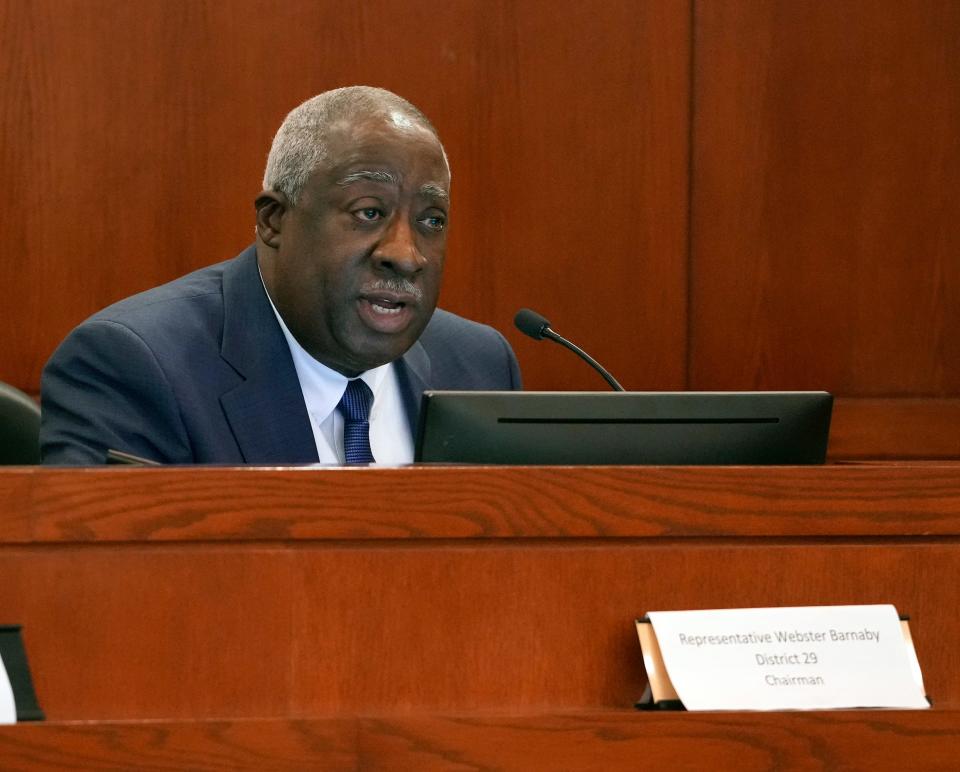Transgender Stetson student says now-outlawed minor gender-affirming care 'saved my life'

Alexander Vargas, a 19-year-old lifelong Floridian, considers himself fortunate to be part of a family and a university community that welcomes who he is, a transgender male.
But he's also had to consider leaving the state he loves because a series of bills signed into law by Gov. Ron DeSantis has left transgender people with fewer rights and more vulnerable to hateful attacks.
Among the new laws is one that promises sanctions against doctors who treat minors for gender dysphoria, including those who provide hormones Vargas started taking when he was 16 that he says saved his life. The same law allows the state to take custody of minors who have had gender-affirming care.
Another sanctions businesses that expose children to “adult performances,” as in drag shows. Other legislation extends prohibitions against public school educators from teaching about gender identity and sexual orientation to grades 4-8. Such instruction was banned last year for grades K-3.
And the law opponents dubbed "Don't Say Gay" was updated to bar school personnel and students from using pronouns for people that differ from their sex assigned at birth. Opponents call the new version the "Don't Say They" law.
Erasing trans options: What can I do if I'm a transgender person living in Florida?
'A tight-knit community': What happens at weekly drag shows at Cafe DaVinci in DeLand?
Advocates say bills go too far
Vargas and other LGBTQ+ advocates say those laws − passed overwhelmingly through a supermajority Republican House and Senate − have tapped into GOP voters' concerns that society has gone too far in accepting transgender and queer people. It's left trans people to consider what their place is in a state controlled by Republicans.
“My family has considered moving at some point because of this legislation because it will be terrible for me and for some other people in my family,” Vargas said. “However, my whole life is here. My friends are here. My partner is here. So it’s not easy to move.
“It’s very depressing that transgender people are starting to become refugees,” he said, adding that trans people in other countries are being warned against moving to the United States because of the shifting political winds.
'Demons and Imps:' Deltona Florida House member's transgender comments spark Twitter firestorm
Acknowledgement: Volusia recognizes LGBTQ+ students after School Board's initial refusal
Vargas, a Stetson University student, was born in a girl’s body.
While growing up in Port Orange, he liked some masculine things and some feminine things. In 5th grade, his confusion about gender intensified.
"When puberty hit, I realized it felt really wrong to be going through female puberty. I ended up at first wondering if I might just be queer and then I started to think maybe I’m gender nonconforming,” Vargas said. “I realized in middle school that I definitely felt more masculine, and I wanted to be seen as a boy.”
He said he started to learn more about the gender spectrum both through reading about it online and talking with friends, some of whom were experiencing similar things.
Vargas learned the term that made sense to him: gender dysphoria.
An imperfect analogy
It’s the discomfort some people feel with their birth sex. It can cause anxiety, depression, and even suicidal thoughts for some people.
Vargas offers up what he admits is not a “perfect analogy,” but it helps explain what he felt.
“Imagine you see a log cabin. You go inside the log cabin and inside it’s decorated like a Victorian mansion,” Vargas said. “That would feel a little bit wrong to you. You would want to fix the outside to look like the inside.”
A haircut in middle school was something of a first step toward fixing his outer appearance. It was a pixie cut.
“Even though a pixie cut is considered a feminine hairstyle, it made me feel more myself. It made me feel more masculine,” Vargas said. “It felt absolutely amazing. I thought, ‘Yes, this is how I’m keeping my hair from now on.’”
Vargas always wore baggy clothing, such as hoodies, which he always put on his Christmas list.
“Don’t you have enough?” his parents would joke.
But it was important to him, particularly in middle school, and it made more sense to them when he told them he wanted to be a boy.
“I realized I was transgender in middle school.”
A new name
That’s when he started asking friends to call him by his masculine name, Alexander. When they did, he loved it. “I realized that was who I was.”
In 7th grade, Vargas came out to his parents.
“After long conversations with them, and (their) learning and coming toward acceptance, I was able to see a gender therapist who specialized in LGBTQ and specialized in gender dysphoria,” Vargas said.
He settled on a therapist he trusted in 9th or 10th grade.
“That’s definitely a process for parents, too” his mother, Heather Vargas, said.
Counseling took years, but it set Vargas on his transition journey.
“A lot of gender-affirming care, it requires to have a therapist’s letter to start. I feel like that’s lost on a lot of people. I feel like the idea that some conservatives have is you just go to a doctor and say, ‘I’m trans,’ and they immediately start stuff. That is far from the truth.”
Vargas believes children considering transitioning should see a therapist first.
“However, I don’t like this legislation because there is a time limit for many trans people when it comes to gender-affirming care. The distress is so much, especially during puberty. When you’re 18, you’re past puberty. You’ve gone through so much distress and that’s only if you survive.”
Wrong-body puberty
“Wrong-body puberty can be so depressing and terrible.”
Alexander Vargas started his physical transformation when he was 16. He got a prescription for hormones. “And that was after multiple years with a gender therapist. There’s a lot of stuff required before I could receive testosterone. I feel like people don’t realize there is a lot required.”
“It was one of the happiest days of my life. I was so excited. And, yes, I did feel major relief,” he said.
Heather Vargas remembers.
“We both cried when they gave him the prescription and it had been such a long journey, even though we knew it was the right thing,” she said.
Under Florida's gender-affirming care ban, minors who begin hormone treatment as Vargas did at age 16 could be taken away from their parents by the state.
More recently, Alexander Vargas has undergone “top surgery,” the removal of his breasts. Once he had a flat chest, most of his dysphoria was gone.
Death threats
Once, Vargas posted a social-media video about a story he had written that included LGBTQ+ characters. Some of the responses he got were death threats.
Public opinion is heavily influenced by what they see in media and hear from politicians, Vargas said.
“Because the GOP is attacking us so much, (people) feel they have the right to attack us, as well. If the government hates us, why can’t they, basically?”

DeSantis said Wednesday, at a bill-signing event for several of the anti-trans bills, that protecting children is paramount when it comes to gender-altering treatments and therapies.
"You have a movement among, I would say, rogue elements of the medical establishment to do things ... basically the mutilation of minors," DeSantis said. "They're trying to do sex-change operations on minors, giving them things like puberty blockers and doing things that are irreversible."
But advocates of the LGBTQ+ community say the gender-affirming care ban and other laws have stripped transgender and nonconforming folks of their rights to healthcare, education, and peace of mind.
The gender-affirming care ban for minors denies parents the ability to make the best health care decisions for their children, said Stephanie Fraim, president and CEO of Planned Parenthood of Southwest and Central Florida.
"This bill is bigotry masquerading as public policy, and it is shameful," she said.
Human Rights Watch, an advocacy organization, documented the killings of at least 18 trans people in Florida between 2016 and 2021.
'Dehumanizing rhetoric'
In a report, Human Rights Watch contends that bills in state capitals such as the ones Florida passed this session "have often featured dehumanizing rhetoric about transgender people, portraying them as predatory, 'mentally ill,' or dangerous, despite research confirming that transgender inclusion has not created safety concerns."
The group reports that transgender people say they feel "less safe as hostility toward transgender people has been openly voiced in legislatures and in media, and available data suggest that bias-motivated violence has increased in recent years."
Transgender adolescents are at a greater risk than their cisgender counterparts of attempting suicide, studies published by the American Academy of Pediatrics and other journals have shown.
Vargas said he considers his treatment a life-saver.
"I would not be here right now if I didn't receive (gender-affirming care), because I felt like an imposter in my own body," he said. "I felt like I was looking at a stranger in the mirror and it was a terrible feeling. ... I hated being called a girl. I felt like it was a slap to the face and being able to be myself now is wonderful and I'm so happy. But if I didn't receive that care then, I will admit I probably would be dead."
His mother, Heather Vargas, added: "By passing this law, the Legislature has condemned children − they say they're trying to protect the children − but what about these kids? If Alex was underage right now and my husband and I, who absolutely did the right thing, would be subject to losing our kid to the state for child abuse."
The 'bathroom bill'
Meanwhile, LGBTQ+ advocates point to another law that also poses risks.
DeSantis also signed into law the so-called "bathroom bill" which requires restrooms or locker rooms at public facilities to be used exclusively for people based on the gender they were assigned at birth.
“This bill criminalizes transgender people for using the restroom that aligns with how they live their lives every day,” said Jon Harris Maurer, public policy director for Equality Florida. “This bill opens the door to abuse, mistreatment, and dehumanization.”

What Republicans are saying
Vargas was taken aback when he learned about controversial comments made by Rep. Webster Barnaby, R-Deltona, during an April 10 House Commerce Committee hearing on the bathroom bill.
"We have people that live among us today on planet Earth that are happy to display themselves as if they were mutants from another planet," Barnaby said. "This is the planet Earth where God created men male and women female."
Barnaby, who identifies himself as a Christian conservative Republican, went on to say: "The Lord rebuke you, Satan, and all of your demons and all of your imps who come and parade before us. That's right, I called you demons and imps who come and parade before us and pretend that you are part of this world."
He later apologized for calling trans people "demons."
Vargas − one of Barnaby's constituents − considers himself agnostic, but attends a Christian church and considers himself spiritual. But he's skeptical of those who make policy in the name of religion.
“There is a reason why church should be separated from the state,” he said.
“People use Satan a lot. They throw around the devil a lot when they’re afraid of something, because they feel protected by God, and God is kind of their normal to them and Satan is different," he said.
"I’m big on believing what you believe as long as it doesn’t hurt anyone.”
House Speaker Paul Renner said in a recent interview on WPLG-Miami that no Republicans were supporting the anti-trans legislation out of spite, and activists' comments suggesting the bills are putting transgender people in jeopardy are wrong.
Fears are 'completely false'
“I think those fears are completely false. They’re politically motivated. But they work, so they go out with the help of some friendly media outlets and say we’re somehow against anybody. We’re not against anybody. We’re for children, all children, whether they’re gay or straight or what-have-you. We’re just saying let’s focus on allowing kids to be kids, and so that’s what this has been about."
Other Republicans suggested young trans people have been led astray by a failure of society.
“We have failed to give them the ultimate gender-affirming care,” said Rep. Randy Fine, R-Palm Bay, according to a WUSF report. “To affirm they are creatures of God made in his image. That they were made the way they are and there is absolutely nothing wrong with it.”
State Rep. Jennifer “Rita" Harris, D-Orlando, was among lawmakers who filed bills seeking to give the LGBTQ+ community a degree of comfort. But those weren't heard in Republican-controlled committees.
Harris worries Florida's stance on the LGBTQ+ community could have a lot of unintended consequences. Her district includes Universal Studios and SeaWorld in Orlando, big players in the tourism industry.
"There are worries it might have a long-term impact on our ability to attract people to the state for conventions and to visit," she said. "There are a lot of unintended consequences to what's happening that don't just impact the trans community, but more widely impact Florida."
In all, the new laws impacting Vargas and other trans Floridians "are taking away basic civil rights from people" while the supermajority in charge "are not really addressing the problems that people really, truly face," such as continually rising property-insurance rates.
Privileged
Vargas has experienced some of the unkindness exhibited toward transgender people.
“I have dealt with people being absolutely terrible at times … telling me I’m going to hell and (that I am) a freak or a mutant or many other very not nice things.”
When he was a 17-year-old senior at Spruce Creek High School, Vargas attended a school board meeting to advocate for the LGBTQ+ community in the wake of a board vote against recognizing LGBTQ+ Health Awareness Week. Despite the board vote, the school superintendent later declared recognition for the event.
At the meeting, he said his community was called “pedophilic," a sentiment that made no sense to him as a minor.
“The main cause of my depression relating to being transgender was about people not accepting me. But I was happy about my body,” he said.
Yet Alexander Vargas considers himself privileged.
“I’m very lucky to have a pretty accepting family,” he said. “I’m very lucky to have the right friends and a great partner who accepts me for who I am.”
This article originally appeared on The Daytona Beach News-Journal: Anti-trans legislation leaves some wondering about future in Florida

